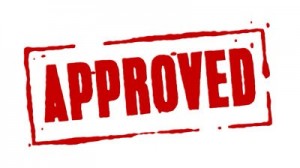
As we always say, nowadays everyone is a number so you might as well have a high one!
Tips for getting that elusive perfect credit score:
If there is one thing that we go over most in a day is educating borrowers about how credit scoring works. A lot of people have no idea what their credit looks like or know what makes credit good other than paying bills on time (which is only 35% of the score). So we do our best to educate our borrowers on how credit scoring works so they can use this knowledge to get that highest tier, walk on water credit score.
35% of your score come from your payment history: This category has the greatest effect on your scores, but past problems like missed or late payments are not easily fixed.
- Pay your bills on time.
Delinquent payments, even if only 30 days late on a small account, and collections can have a major negative impact on your FICO score. - If you have missed payments, get current and stay current.
The longer you pay your bills on time after being late, the more your FICO score should increase. Older credit problems count for less, so poor credit performance won’t haunt you forever. The impact of past credit problems on your FICO score fades as time passes and as recent good payment patterns show up on your credit report. And good FICO scores weigh any credit problems against the positive information that says you’re managing your credit well. - Be aware that paying off a collection account will not remove it from your credit report.
It will stay on your report for seven years from the date of last activity - If you are having trouble making ends meet, contact your creditors or see a legitimate credit counselor.
This won’t rebuild your credit score immediately, but if you can begin to manage your credit and pay on time, your score should increase over time. And seeking assistance from a credit counseling service will not hurt your FICO score.
30% of your score comes from balance compared to credit limits on revolving accounts.
- Keep balances low on credit cards and other “revolving credit” like lines of credit.
High outstanding debt can affect a credit score. - Pay off debt rather than moving it around.
The most effective way to improve your credit score in this area is by paying down your revolving (credit cards) debt. In fact, owing the same amount but having fewer open accounts may lower your score. - Don’t close unused credit cards as a short-term strategy to raise your score.
- Don’t open a number of new credit cards that you don’t need, just to increase your available credit.
This approach could backfire and actually lower your credit score.
Length of Credit History Tips
- If you have been managing credit for a short time, don’t open a lot of new accounts too rapidly.
New accounts will lower your average account age, which will have a larger effect on your score if you don’t have a lot of other credit information. Also, rapid account buildup can look risky if you are a new credit user.
New Credit Tips
- Do your rate shopping for a given loan within a focused period of time.
FICO scores distinguish between a search for a single loan and a search for many new credit lines, in part by the length of time over which inquiries occur. - Re-establish your credit history if you have had problems.
Opening new accounts responsibly and paying them off on time will raise your credit score in the long term. - Note that it’s OK to request and check your own credit report.
This won’t affect your score, as long as you order your credit report directly from the credit reporting agency or through an organization authorized to provide credit reports to consumers.
Types of Credit Use Tips
- Apply for and open new credit accounts only as needed.
Don’t open accounts just to have a better credit mix – it probably won’t raise your credit score. - Have credit cards, but manage them responsibly.
In general, having credit cards and installment loans (and paying timely payments) will rebuild your credit score. Someone with no credit cards, for example, tends to be higher risk than someone who has managed credit cards responsibly. - Note that closing an account doesn’t make it go away.
A closed account will still show up on your credit report, and may be considered by the score. - A good mix of credit such as a mortgage, an installment loan (like a car loan), and 2 – 3 credit cards open for a very long time with low balances compared to the credit limits
Check out these additional blogs on credit reports and scoring:
[av_button label=’You May Not Know It, But You Are a Number & It Could Hurt’ link=’manually,http://teammovemortgage.com/blog/2015/05/16/best-tip-to-raise-credit-scores-fast-2015/’ link_target=’_blank’ size=’large’ position=’center’ icon_select=’no’ icon=’ue800′ font=’entypo-fontello’ color=’theme-color’ custom_bg=’#444444′ custom_font=’#ffffff’]
[av_button label=’Why & How You Should Check Your Credit Every Year At Least’ link=’manually,http://teammovemortgage.com/blog/2015/03/01/why-how-you-should-check-your-credit-report-every-year/’ link_target=’_blank’ size=’large’ position=’center’ icon_select=’no’ icon=’ue800′ font=’entypo-fontello’ color=’theme-color’ custom_bg=’#444444′ custom_font=’#ffffff’]
Team Move lends in areas such as Wilmington, Leland, Hampstead, Jacksonville, Camp Lejeune, Whiteville, Shallotte, Southport, Elizabethtown, Lumberton, Fort Bragg, Pope Air Force Base, Fayetteville, Rockingham, Raleigh, Garner, Smithfield, Clayton, Goldsboro, Charlotte, Greensboro, Winston-Salem, Durham, Chapel Hill, Burgaw, Castle Hayne, Holden Beach, Supply, Ocean Isle Beach, Sunset Beach, Hubert, Tabor City, Carolina Beach, Kure Beach, Laurinburg, Topsail Beach, North Topsail Beach, Surf City, Sneads Ferry, Richlands, Wrightsville Beach, New Bern, Oak Island, Saint James, Wallace, as well as the rest of NC. North Myrtle Beach, Myrtle Beach, Conway, Loris, Little River, Longs, as well as the rest of South Carolina and Virginia.